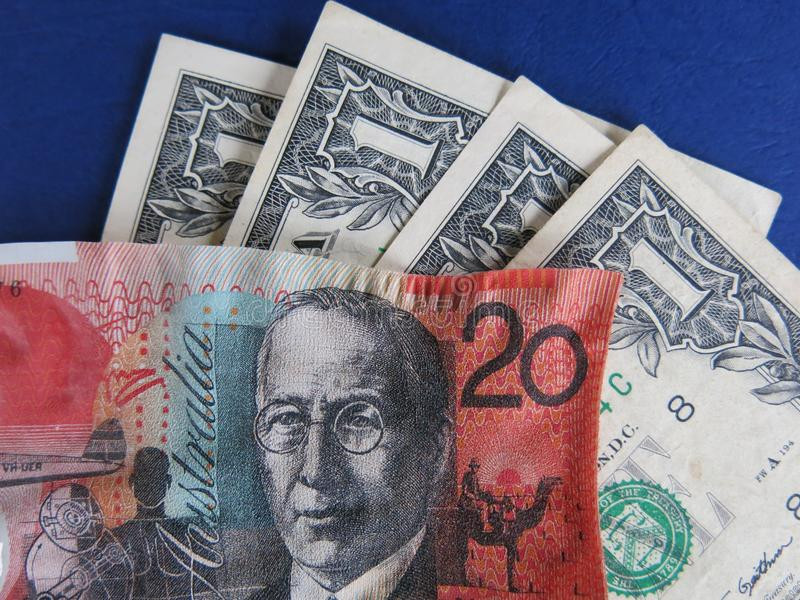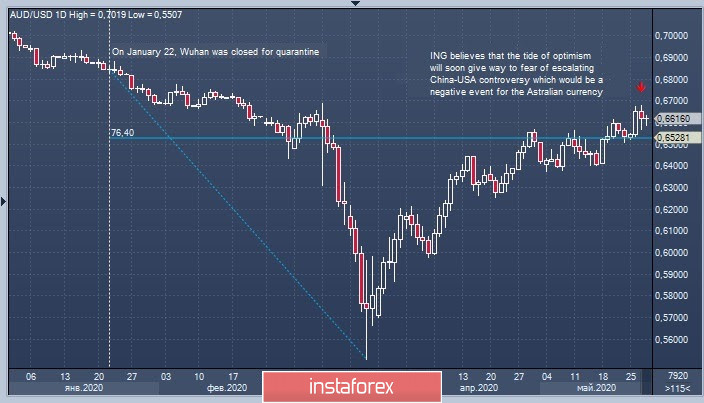
According to some analysts, gloominess is gathering over the Australian dollar. The currency of the Green Continent, previously existing separately, trying to maintain a balance of its own and other interests, can become a participant in the prolonged trade conflict between the United States and China. Experts fear that in this case, the Australian dollar will suffer greatly.
According to the calculations of the currency strategists of ING Bank, a similar scenario is quite possible. They cite the example of the rapid collapse of the "Australian" currency in late January 2020, when the Chinese City of Wuhan, which was the first to suffer from an outbreak of coronavirus infection, was quarantined. During that period, the AUD collapsed to record levels. This was emphasized by ING. Experts explain such a failure in the dynamics of the AUD that the Australian economy, along with the national currency, is highly dependent on the economic and political situation in China.

At the end of this month and the beginning of summer, it returned some of the losses incurred earlier. To date, the Australian currency feels much more cheerful than in winter and early spring. In the middle of this week, the AUD/USD pair slightly lost its position, retreating from its previous high of 0.6679. On Thursday, May 28, the Australian dollar fell 0.4%, closing trading at 0.6623. On Friday morning, May 29, the Aussie began with positive levels of 0.6663-0.6664, but then slipped to lower values. To date, the AUD/USD pair is kept near 0.6658 - 0.6659, trying to strengthen to high levels from time to time.
A strong pressure on the AUD/USD pair may be exerted by an increase in the degree of tension between Washington and Beijing. According to experts, a new round of the trade war threatens to cancel the preliminary agreements between the countries, which were hardly reached during the first round of negotiations. Additional provocative factors intervened in the current conflict between the two powers, including the refusal of the PRC to cooperate in investigating the causes of COVID-19 and the development of the Hong Kong national security bill, which caused an anger attack from the United States. It can be recalled that the United States threatened China with the imposition of new sanctions in the event of the adoption of this bill.
According to ING, a positive impact on the dynamics of the Australian dollar will be the removal of quarantine restrictions in most economies in the world and rising commodity prices. However, the question of the next round of the trade conflict between the United States and China remains open. It should be noted that Australia in the wake of American politics, while the country's economic dependence on China, is very strong. Experts emphasize, this makes it vulnerable to possible difficulties.
ING draws attention to a number of difficulties that the Australian economy may face. First of all, they include problems related to the import of coal to China. Analysts are confident that China, being one of the world's largest consumers of this fuel, will take all measures to support national producers. One of these measures will be to tighten import rules. In such a situation, the Australian economy, which depends on the export of this fuel, will significantly sink. According to experts, the impact will be significant, since the lion's share of Australian coal (23%) is exported to China. This may be the last straw, since the economy of Australia has already suffered greatly, having faced a huge downturn over the past 30 years.
Moreover, according to analysts at ING, there is currently no complete ban on coal imports from Australia, but a similar scenario is possible in the future. If this option is implemented, experts are sure that Australia will become a participant in the trade confrontation between the US and China. This would jeopardize other vital exports of Australia, primarily the supply of iron ore and natural gas (LNG). Nevertheless, the Australian authorities will try to prevent the development of such almost disastrous events, otherwise the country's economy will be on the verge of collapse.
If the negative option is implemented, the AUD/USD pair will return to low values near the level of 0.6000, according to ING. The impulse of the long-term fall in the Australian currency may be the weakening of the yuan. Earlier, experts said there was a high probability of a decline in the Chinese currency. The catalyst for such a fall could be an increase in unemployment in China. It can be recalled that in March this year, unemployment in China reached an impressive 19%. According to analysts, this will increase the downward pressure on interest rates by the Central Bank of China. If this scenario is implemented, the Chinese currency will weaken noticeably, which will not go in vain for other currencies. As a result, the AUD, which closely correlates with the yuan, will fall significantly, and its recovery will drag on for a long time.
An additional impulse of the Australian dollar decline may be the easing of monetary policy by the Reserve Bank of Australia (RBA). At the moment, the Australian currency remains under pressure, since the incentive measures taken by the regulator remain in force. According to Philip Lowy, the head of the RBA, they will continue until they reach the targets for employment and inflation. P. Lowe emphasized that the effectiveness of the measures taken is confirmed by the latest macroeconomic data, which turned out to be quite positive.
According to ING analysts, the key factor for the fall of the AUD remains the high probability of the increasing relations between the United States and China. In a similar situation, the AUD/USD pair will reach 0.6400 in the second quarter of 2020. The potential for further recovery of the AUD is limited by most negative factors, and the risks of reduction are steadily growing. Analysts summarize that if Australia is involved in a trade conflict between the United States and China, the existing pair of states will turn into a trio, and the role of Australia in this case is unenviable. Australia, becoming the "third excess" in the confrontation of major powers, will suffer more than others, and its currency will fall to critical values.





















